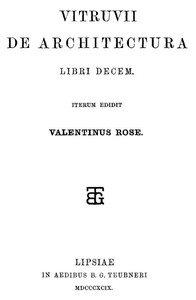Vitruvii De architectura libri decem by Vitruvius Pollio
"Vitruvii De architectura libri decem" by Vitruvius Pollio is a treatise on architecture written between 30-20 BC. As the only architectural treatise to survive from antiquity, it served as a comprehensive guide for building projects dedicated to Emperor Augustus. The work covers everything from military camps and aqueducts to machines and measuring devices, blending Greek and Roman knowledge with practical engineering. Its famous principles of utility, strength, and beauty influenced architects for
centuries, though it predates Rome's greatest architectural innovations like domes and concrete vaulting. (This is an automatically generated summary.)
Read or download for free
| How to read | Url | Size | |||
|---|---|---|---|---|---|
| Read now! | https://www.gutenberg.org/ebooks/51812.html.images | 2.0 MB | |||
| EPUB3 (E-readers incl. Send-to-Kindle) | https://www.gutenberg.org/ebooks/51812.epub3.images | 1.2 MB | |||
| EPUB (older E-readers) | https://www.gutenberg.org/ebooks/51812.epub.images | 1.2 MB | |||
| EPUB (no images, older E-readers) | https://www.gutenberg.org/ebooks/51812.epub.noimages | 626 kB | |||
| Kindle | https://www.gutenberg.org/ebooks/51812.kf8.images | 1.9 MB | |||
| older Kindles | https://www.gutenberg.org/ebooks/51812.kindle.images | 1.8 MB | |||
| Plain Text UTF-8 | https://www.gutenberg.org/ebooks/51812.txt.utf-8 | 1.3 MB | |||
| Download HTML (zip) | https://www.gutenberg.org/cache/epub/51812/pg51812-h.zip | 1.1 MB | |||
| There may be more files related to this item. | |||||
Similar Books
About this eBook
| Author | Vitruvius Pollio |
|---|---|
| Contributor | Cetius Faventinus, Marcus |
| Editor | Rose, Valentin, 1829-1916 |
| Title | Vitruvii De architectura libri decem |
| Note | "M. Ceti Faventini Liber artis architectonicae": p. 283-304 |
| Note | Wikipedia page about this book: en.wikipedia.org/wiki/De_architectura |
| Credits |
Produced by Ted Garvin, abi278, Stephen Rowland and the Online Distributed Proofreading Team at www.pgdp.net |
| Reading Level | Reading ease score: 49.8 (College-level). Difficult to read. |
| Language | Latin |
| LoC Class | NA: Fine Arts: Architecture |
| LoC Class | PA: Language and Literatures: Classical Languages and Literature |
| Subject | Architecture -- Early works to 1800 |
| Category | Text |
| EBook-No. | 51812 |
| Release Date | Apr 20, 2016 |
| Most Recently Updated | Oct 23, 2024 |
| Copyright Status | Public domain in the USA. |
| Downloads | 655 downloads in the last 30 days. |
| Project Gutenberg eBooks are always free! | |

